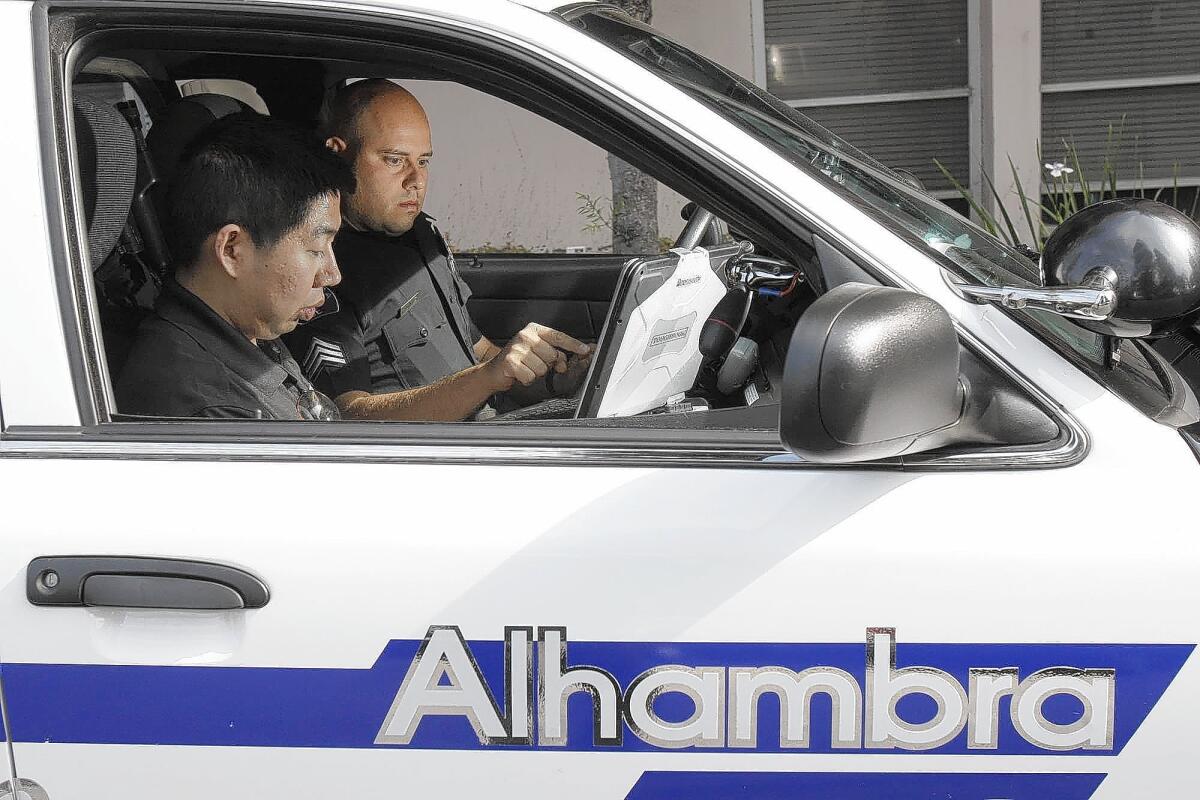Great Read: Alhambra police work social media beat to reach Chinese speakers

- Share via
An estranged daughter tearfully confronts her family at Twohey’s Restaurant and refuses to leave. A few minutes later, the call dings into the laptop in Alhambra Police Sgt. Eddie Rodriguez’s cruiser.
He steps on the gas as his partner for the day, police volunteer Walter Yu, fires up the department’s Weibo account.
“Alhambra police are en route to Twohey to handle an incident of customer harassment,” Yu writes in Chinese, and taps send.
Within minutes the post is deluged with likes and comments. One user says a man exposed himself near that location, and asks what to do. Another asks him to explain the meaning of harassment. Yu’s fingers dance over his iPhone trying to respond.
In a city with about 30,000 Chinese residents and just four sworn officers who can speak Chinese, police leaders hope Weibo, the world’s largest social network, will help bridge the cultural divide.
Late last year, the Alhambra Police Department became the first police agency in the U.S. to launch a full-time Weibo account. The Chinese microblogging service, a mashup of Twitter and Facebook, has a strong following in the San Gabriel Valley, where Chinese residents use it to stay in touch with news and friends from back home.
Weibo sources are starting to produce some useful tips — information from Weibo users helped Yu shine a light on a fake rental-car voucher scam targeting Chinese nationals. But most of the time, Weibo commenters just have questions. Is my landlord supposed to have a key to my apartment? Are police officers in the U.S. supposed to carry guns all the time? Do pedestrians really have the right of way?
Yu, who joined Rodriguez on patrol for a social media “ride-along,” was born in China and moved to the U.S. during high school. He spends up to 20 hours a week monitoring the account and answering questions.
The Police Department joined Weibo to do police work, but it soon fell into a different role: explaining America.
::
About once a week, the phone rings at the Alhambra Police Department’s 911 dispatch center, and an operator picks up to a stammered explanation — the caller has misdialed trying to reach China.
“It gets tricky when they have to dial 9 first,” said Gamaliel Catalan, who helps run the Police Department’s dispatch center. “Then sometimes they forget the 0.”
The dispatch center sends the callers on their way with some instructions about long-distance dialing. But for the rest of the Police Department, it’s not so easy. Alhambra is one of the county’s most diverse cities, and one of its most segregated.
In 2009, USC researchers tried to measure the sense of community in seven diverse neighborhoods in Los Angeles, noting factors such as home ownership, the length of residence, consumption of local news and participation in community organizations. They found that Chinese residents in the western San Gabriel Valley, which includes Alhambra, had the weakest connections to their community.
Alhambra’s Chinese and non-Chinese populations tend to live in their own bubbles, said Mayor Stephen Sham, the city’s only Chinese councilman. They read different newspapers, attend their own churches and vote for different politicians.
Even Alhambra’s geography is polarized — Chinese people shop and dine on Valley Boulevard in the southern part of the city, while white and Latino businesses typically cluster on Main Street to the north.
“The Asian community doesn’t always understand the concerns of the non-Asian community, and vice versa,” Sham said.
That makes things complicated for the Police Department, said Chief Mark Yokoyama.
“When you have 30,000 Chinese people in a city of 84,000, and a majority of them aren’t communicating with the Police Department, you can say you have community policing as much as you want, but you really don’t,” Yokoyama said.
Language is part of the problem. But perceptions are the biggest hurdle, said Cpl. Bob Torrance, who has patrolled the city for about 25 years. Many Chinese immigrants carry fearful memories of more militarized police forces in China.
“They are just hesitant to trust us,” Torrance said. “They just stay silent usually.”
::
Yu’s interest in language access issues began during his day job, working as a contract interpreter for the Los Angeles County Superior Court.
Many of his clients, he realized, needed more than translation services. Defendants misunderstood how U.S. courts work and were afraid to say so. They’d ask the prosecutor for advice and accidentally reveal incriminating information, or avoid court proceedings entirely, resulting in even higher penalties.
Interpreters can’t offer legal help. Yu, 30, could only watch and wince.
“A language miscommunication snowballs into something bigger,” Yu said. “And it could all be easily avoided.”
Weibo, Yu thought, was a way for public agencies to reach Chinese immigrants on their own turf. Last July, he wrote an article for the Alhambra Source encouraging local agencies to join.
Yokoyama saw the article and began to meet with Yu and editors from the Alhambra Source, which has collected Weibo comments as a resource for researchers at USC’s Annenberg School of Communications, to discuss opening an account. And in December, it went live.
The response was immediate. After three weeks, it had about 6,000 followers and its posts were making national headlines in China. A talk show even flew Yu to Shanghai for an interview. Representatives from Weibo featured Yu in a live social media chat in the style of Reddit’s Ask Me Anything chat threads.
The department’s account now has more than 12,300 followers — three times as many followers as its Facebook and Twitter accounts combined.
The comments on the site offer a snapshot of the fears and anxieties that define a new immigrant’s daily life.
Many users probe the differences between police in China and Alhambra. Why doesn’t the police station have beds like in China, where officers are housed in barracks? Why is the station so small, while China’s teeming cities have larger police complexes?
Some are more practical. Does my 8-year-old need a car seat? Can you have a car towed because it is parked illegally? If you hit aforementioned illegally parked car while backing your own car up, do you have to pay for repairs?
Their questions are familiar to Sham, who joined Weibo last year after the Police Department’s account went live. He uses his account to urge Chinese residents to attend city events and participate in government functions.
The Chinese-speaking population, he said, “wants to meet us in the middle. But they don’t always know how.”
::
Yu posts about 20 to 30 times a week, explaining traffic jams, helicopter noises and how to obtain a driver’s license. There are still some snarky jokes about how weird life is in America, but people are grateful to have things explained in their own language.
“Don’t forget to pay your parking tickets,” Yu wrote recently, posting a picture of a vehicle covered in parking citations. “If you don’t pay the fee, your car could be sold at auction.”
It’s difficult to measure the impact of the department’s experiment.
There’s no way to tell, for instance, how many Alhambra residents are following the account — though Yu estimates that about 40% of the 12,000 followers are local, based on an informal survey he conducted on Weibo.
But Torrance says he’s noticed a few differences on patrol: more people waving back to him on the street, and friendly questions at Starbucks instead of fearful stares. And Chinese residents seem to be calling the police more often — the number of calls requiring Chinese translation services has jumped by more than 60% in the months since the department got on Weibo.
Tony Xu, head chef at Chengdu Taste, a popular Sichuan restaurant on Valley Boulevard, said reading about crackdowns on car thefts and loitering makes him feel safer.
“You can see them at work,” Xu said. “You can see that police here are not scary like they are in China.”
The Chinese community is listening, Yokoyama said. Now the Police Department has to earn its trust.
“All we’ve seen so far is the door opening,” Yokoyama said.
The next big Chinese social network is WeChat, phone-based group messaging that could end up eclipsing Weibo’s 500 million users. Yokoyama is exploring the idea of an Alhambra Police WeChat.
Yu has already started doing some tests.
Twitter: @frankshyong
More to Read
Sign up for Essential California
The most important California stories and recommendations in your inbox every morning.
You may occasionally receive promotional content from the Los Angeles Times.











